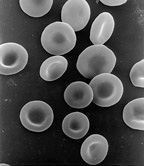
Photo from wikipedia
Endothelial cells play an obligatory role in regulating local vascular tone and maintaining homeostasis in vascular biology. Cell metabolism, converting food to energy in organisms, is the primary self-sustaining mechanism… Click to show full abstract
Endothelial cells play an obligatory role in regulating local vascular tone and maintaining homeostasis in vascular biology. Cell metabolism, converting food to energy in organisms, is the primary self-sustaining mechanism for cell proliferation and reproduction, structure maintenance, and fight-or-flight responses to stimuli. Four major metabolic processes take place in the energy-producing process, including glycolysis, oxidative phosphorylation, glutamine metabolism, and fatty acid oxidation. Among them, glycolysis is the primary energy-producing mechanism in endothelial cells. The present review focused on glycolysis in endothelial cells under both physiological and pathological conditions. Since the switches among metabolic processes precede the functional changes and disease developments, some prophylactic and/or therapeutic strategies concerning the role of glycolysis in cardiovascular disease are discussed.
Journal Title: Acta pharmacologica Sinica
Year Published: 2021
Link to full text (if available)
Share on Social Media: Sign Up to like & get
recommendations!